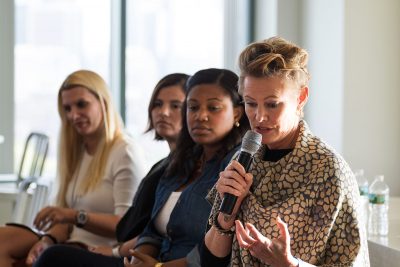
There’s fear, there’s self-doubt, there’s a great wide ocean below — there’s a spectrum of emotions and thoughts when taking a leap of faith to follow one’s passions.
Often overlooked, there is usually a path-changing moment that inspires that risky leap in the first place.
Five of Boston’s top female entrepreneurs shared their own “aha moments” from their innovation-based careers, including their risky leaps, at Microsoft’s New England Research and Development Center, during Boston’s second annual HUBweek Tuesday.
“Women in Innovation Story Slam: Aha Moments” was hosted by Microsoft and LaunchSquad, a public relations firm.
Five women were featured on the panel: Jules Pieri, co-founder and CEO of The Grommet; Dr. Yuly Fuentes-Medel, executive director of Descience; Elizabeth Lawler, CEO and co-founder of Conjur, Inc.; Tanya Bakalov, co-founder and chief of staff of SevOne; and Melissa James, founder and CEO of The Tech Connection.
Filling up the seats, the couches and even the staircases throughout the room, roughly 80 attendees listened to the speakers discuss what exactly sparked change early in their careers, whether it be walking away from Google or “faking it until you make it.”
James and other speakers noted risks associated with young startups, but also the valuable opportunities that paired alongside them.
“I had no idea all those moments from when I was applying to go to college … I was learning how to be resilient,” James said, on the initial creation of The Tech Connection. “I was learning how to navigate these big blue oceans. Starting a company is just like that. There’s a big blue ocean, and every day I wake up and say, ‘What don’t I know?’”
James worked as a technical recruiter at Google before leaving in 2014 to start The Tech Connection, which helps young technical professionals with career planning and job placement, according to its website.
Bakalov, previously a senior consultant at Deloitte, co-founded SevOne, a digital infrastructure management company, when her husband decided to leave his job, she said.
“None of [these risks] entered my mind,” Bakalov said. “Just, ‘alright, let’s do this. Let’s learn something new.”
“Behind the blue hen comic book store, and ..the kung fu shop,” @tanyabakalov, on directions to @SevOneInc‘s first office, now in The Pru.
— Natasha Mascarenhas (@nmasc_) September 27, 2016
For others, inspiration came at an unlikely time.
When Pieri’s startup began to fail and received multiple rejections from venture capitalists during the recession in 2008, her mother also passed away. Later on, kept awake from the noise of a thunderstorm, Pieri received an email from a firm approving her application for capital.
“That thunderstorm was my mother in heaven, throwing around some boulders,” Pieri said. “She said ‘I’ve had enough of this. My daughter had been queen of rejection long enough. Let’s get this deal done and save the company.’ And she did, and I did too.”
A few years ago, Fuentes-Medel attended the graduation of a friend who studied fashion at the Massachusetts College of Art and Design. The commencement, Fuentes-Medel said, was a fashion show and the “aha moment” that inspired her to develop what would later become Descience. Descience connects fashion designers with scientists to combine the two careers, according to its website.
“Every single color and texture was telling me so many things,” Fuentes-Medel said. “Fashion can be the one language where we all can speak the same. I started observing something: creativity. We all have it and convey it in different ways”
On the birth of @FashioDescience, by @ValueofScience #HUBweek pic.twitter.com/PUgZdOD8NO
— Natasha Mascarenhas (@nmasc_) September 27, 2016
The crowd was as diverse as the speakers themselves.
“[The lineup and program] combines all my favorite things: women, innovation and networking,” said Alyssa Feola, 29, a cybersecurity advisor for the U.S. Air Force from Watertown. “I’d like to meet people face to face and explore new opportunities. I envision myself working toward a job as a cybersecurity advisor for the Department of Homeland Security. That’s why the women empowerment and networking appeals to me.”
Some of the speakers noted that self-doubt sometimes holds women back from taking the necessary plunge and starting a new company.
Lawler’s company, Conjur, Inc., assesses the risks different businesses take concerning their data and provides cybersecurity and other guidance, according to its website. One of Lawler’s “Aha moments,” she said, was realizing that although she helped encourage others to take risks, she took none herself.
“I wasn’t taking risks to be the leader I wanted,” Lawler said. “I hadn’t taken risks in being CEO until later. Although I had made a company for people taking risks, I hadn’t.”
The evening capped with all the speakers sharing advice to their fellow females looking to enter a male-dominated field.
“As women, we undersell ourselves a ton,” Bakalov said during an audience question-and-answer session at the end of the event. “We need someone to ask us, ‘Why do you think that way?’ and to have someone point that out to us is precious.”





















































































































